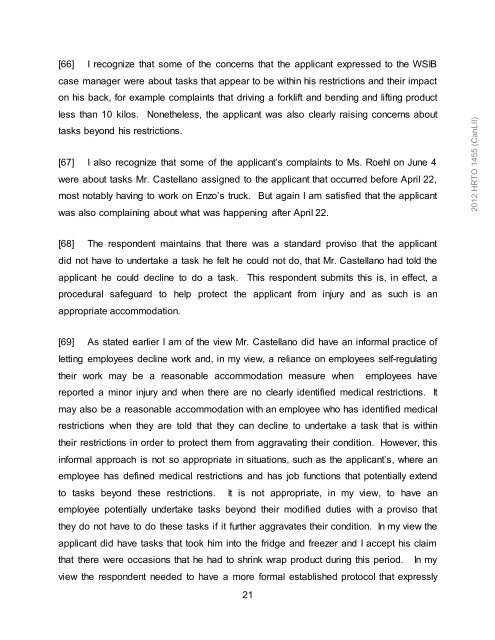FAQ's Cases - Stewart McKelvey
FAQ's Cases - Stewart McKelvey
FAQ's Cases - Stewart McKelvey
- No tags were found...
Create successful ePaper yourself
Turn your PDF publications into a flip-book with our unique Google optimized e-Paper software.
[66] I recognize that some of the concerns that the applicant expressed to the WSIBcase manager were about tasks that appear to be within his restrictions and their impacton his back, for example complaints that driving a forklift and bending and lifting productless than 10 kilos. Nonetheless, the applicant was also clearly raising concerns abouttasks beyond his restrictions.[67] I also recognize that some of the applicant’s complaints to Ms. Roehl on June 4were about tasks Mr. Castellano assigned to the applicant that occurred before April 22,most notably having to work on Enzo’s truck. But again I am satisfied that the applicantwas also complaining about what was happening after April 22.2012 HRTO 1455 (CanLII)[68] The respondent maintains that there was a standard proviso that the applicantdid not have to undertake a task he felt he could not do, that Mr. Castellano had told theapplicant he could decline to do a task. This respondent submits this is, in effect, aprocedural safeguard to help protect the applicant from injury and as such is anappropriate accommodation.[69] As stated earlier I am of the view Mr. Castellano did have an informal practice ofletting employees decline work and, in my view, a reliance on employees self-regulatingtheir work may be a reasonable accommodation measure when employees havereported a minor injury and when there are no clearly identified medical restrictions. Itmay also be a reasonable accommodation with an employee who has identified medicalrestrictions when they are told that they can decline to undertake a task that is withintheir restrictions in order to protect them from aggravating their condition. However, thisinformal approach is not so appropriate in situations, such as the applicant’s, where anemployee has defined medical restrictions and has job functions that potentially extendto tasks beyond these restrictions. It is not appropriate, in my view, to have anemployee potentially undertake tasks beyond their modified duties with a proviso thatthey do not have to do these tasks if it further aggravates their condition. In my view theapplicant did have tasks that took him into the fridge and freezer and I accept his claimthat there were occasions that he had to shrink wrap product during this period. In myview the respondent needed to have a more formal established protocol that expressly21
















